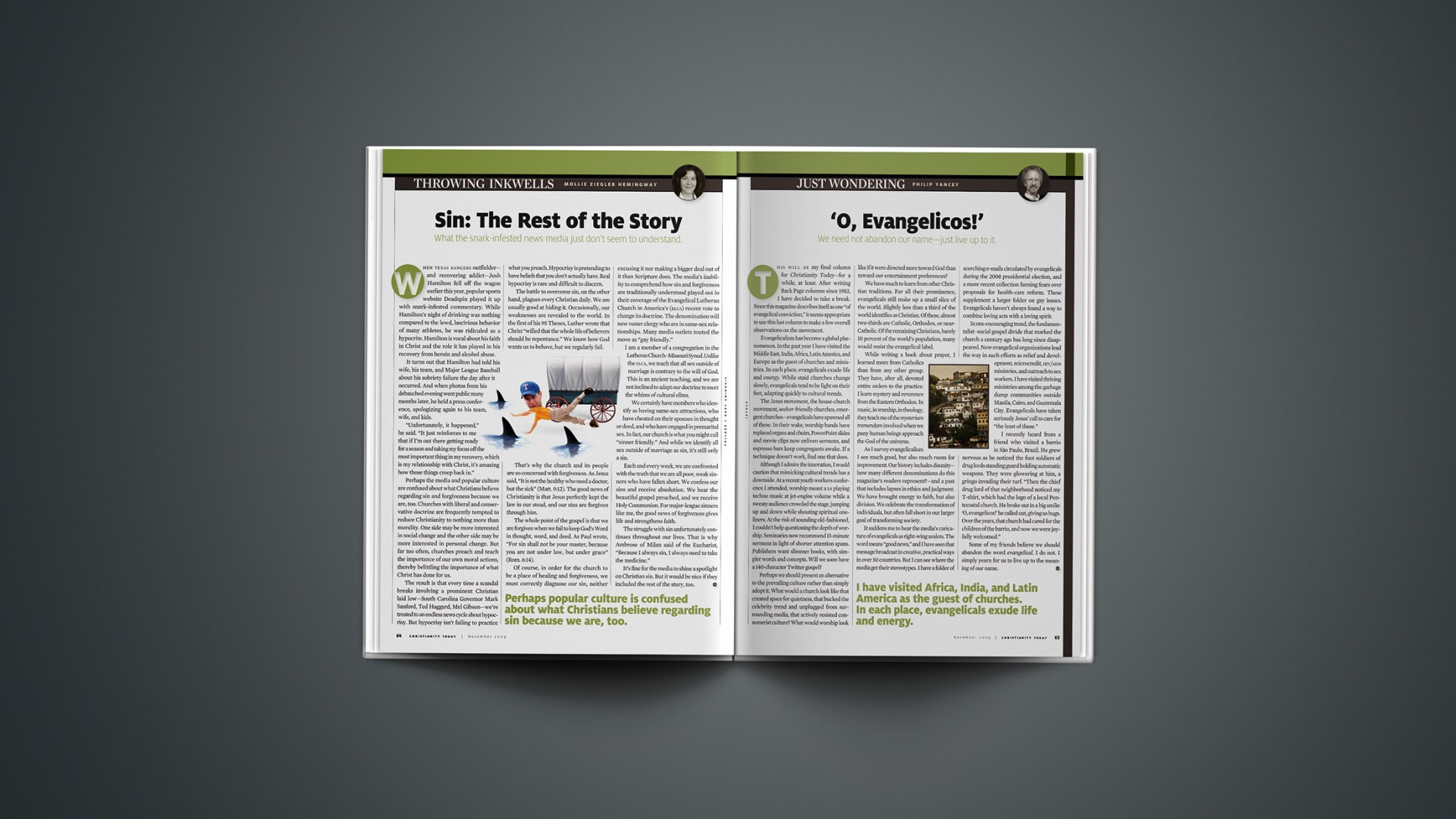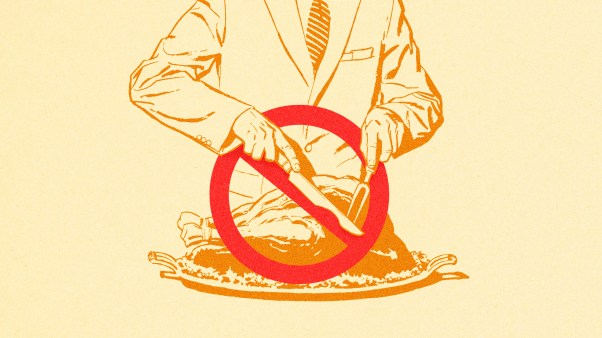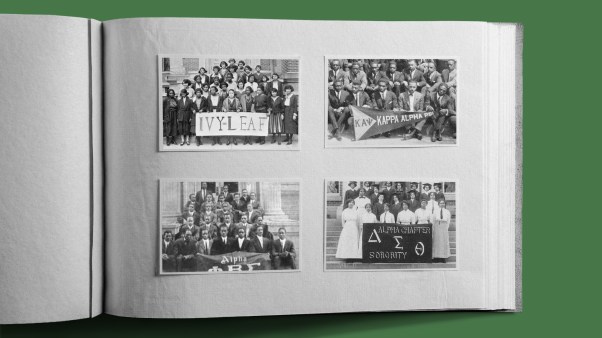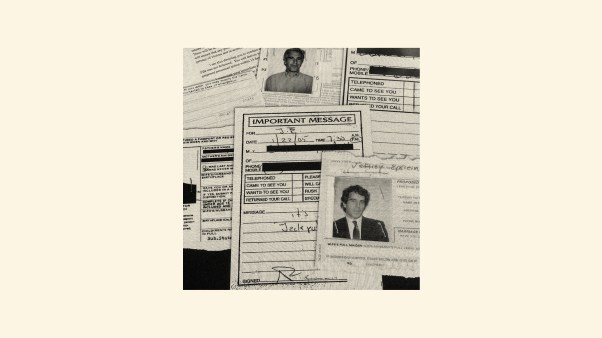This will be my final column for Christianity Today—for a while, at least. After writing Back Page columns since 1983, I have decided to take a break. Since this magazine describes itself as one “of evangelical conviction,” it seems appropriate to use this last column to make a few overall observations on the movement.
Evangelicalism has become a global phenomenon. In the past year I have visited the Middle East, India, Africa, Latin America, and Europe as the guest of churches and ministries. In each place, evangelicals exude life and energy. While staid churches change slowly, evangelicals tend to be light on their feet, adapting quickly to cultural trends.
The Jesus movement, the house-church movement, seeker-friendly churches, emergent churches—evangelicals have spawned all of these. In their wake, worship bands have replaced organs and choirs, PowerPoint slides and movie clips now enliven sermons, and espresso bars keep congregants awake. If a technique doesn’t work, find one that does.
Although I admire the innovation, I would caution that mimicking cultural trends has a downside. At a recent youth workers conference I attended, worship meant a DJ playing techno music at jet-engine volume while a sweaty audience crowded the stage, jumping up and down while shouting spiritual one-liners. At the risk of sounding old-fashioned, I couldn’t help questioning the depth of worship. Seminaries now recommend 15-minute sermons in light of shorter attention spans. Publishers want slimmer books, with simpler words and concepts. Will we soon have a 140-character Twitter gospel?
Perhaps we should present an alternative to the prevailing culture rather than simply adopt it. What would a church look like that created space for quietness, that bucked the celebrity trend and unplugged from surrounding media, that actively resisted consumerist culture? What would worship look like if it were directed more toward God than toward our entertainment preferences?
We have much to learn from other Christian traditions. For all their prominence, evangelicals still make up a small slice of the world. Slightly less than a third of the world identifies as Christian. Of these, almost two-thirds are Catholic, Orthodox, or near-Catholic. Of the remaining Christians, barely 10 percent of the world’s population, many would resist the evangelical label.
While writing a book about prayer, I learned more from Catholics than from any other group. They have, after all, devoted entire orders to the practice. I learn mystery and reverence from the Eastern Orthodox. In music, in worship, in theology, they teach me of the mysterium tremendum involved when we puny human beings approach the God of the universe.
As I survey evangelicalism I see much good, but also much room for improvement. Our history includes disunity—how many different denominations do this magazine’s readers represent?—and a past that includes lapses in ethics and judgment. We have brought energy to faith, but also division. We celebrate the transformation of individuals, but often fall short in our larger goal of transforming society.
It saddens me to hear the media’s caricature of evangelicals as right-wing zealots. The word means “good news,” and I have seen that message broadcast in creative, practical ways in over 50 countries. But I can see where the media get their stereotypes. I have a folder of scorching e-mails circulated by evangelicals during the 2008 presidential election, and a more recent collection fanning fears over proposals for health-care reform. These supplement a larger folder on gay issues. Evangelicals haven’t always found a way to combine loving acts with a loving spirit.
In one encouraging trend, the fundamentalist-social gospel divide that marked the church a century ago has long since disappeared. Now evangelical organizations lead the way in such efforts as relief and development, microcredit, HIV/AIDS ministries, and outreach to sex workers. I have visited thriving ministries among the garbage dump communities outside Manila, Cairo, and Guatemala City. Evangelicals have taken seriously Jesus’ call to care for “the least of these.”
I recently heard from a friend who visited a barrio in São Paulo, Brazil. He grew nervous as he noticed the foot soldiers of drug lords standing guard holding automatic weapons. They were glowering at him, a gringo invading their turf. “Then the chief drug lord of that neighborhood noticed my T-shirt, which had the logo of a local Pentecostal church. He broke out in a big smile: ‘O, evangelicos!’ he called out, giving us hugs. Over the years, that church had cared for the children of the barrio, and now we were joyfully welcomed.”
Some of my friends believe we should abandon the word evangelical. I do not. I simply yearn for us to live up to the meaning of our name.
Copyright © 2009 Christianity Today. Click for reprint information.
Related Elsewhere:
Previous columns by Philip Yancey are available on our site, and include:
Intensive Care Week | Thoughts while sitting beside my brother as his brain and body failed. (September 14, 2009)
A Whole Good World Outside | Opening our blinds to the prevailing wonder of creation. (July 6, 2009)
Surveying the Wondrous Cross | Understanding the Atonement is about more than grasping a theory. (May 27, 2009)
Previous articles on evangelicalism include:
In the Beginning, Grace | Evangelicals desperately need spiritual and moral renewal—on that everyone agrees. But what do we do about it? (October 2, 2009)
The Case for Christendom | A renewed sense of Christian culture could be the key to younger evangelicals’ angst. (August 24, 2009)
The Great Evangelical Anxiety | Why change is not our most important product. (July 16, 2009)









